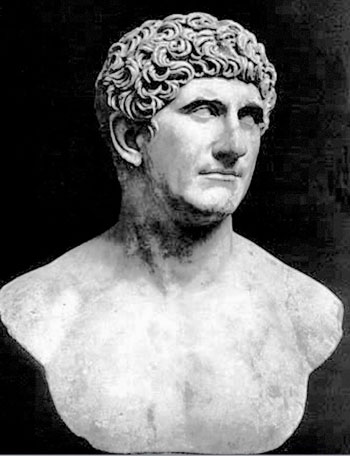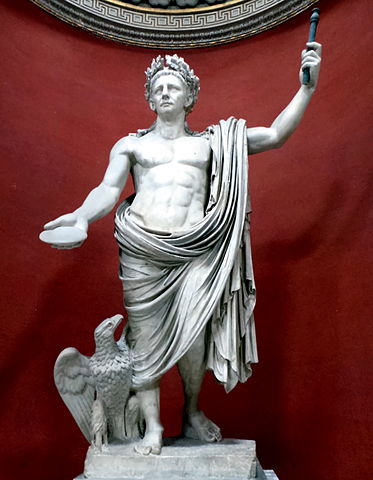10 Oct Fake News Damnatio Memoriae Mark Antony
Damnatio Memoriae Mark Antony

Bust of Mark Anthony Vatican City
Damnatio Memoriae Mark Antony
The legacy of Marcus Antonius (Mark Antony) has been a fascinating topic I’ve researched in support of writing the Curse of Clansmen and Kings series. The act of damnatio memoriae on his great-grandfather, Mark Anthony, still curses Marcellus, the lead character in the historical fantasy series.
Octavian, later known as Emperor Augustus, had Antony’s memory damned forever after defeating him and Cleopatra in 30 BC. Most of the statues of Mark Anthony were destroyed, and his name removed from all records. Even though Augustus achieved supreme power in 27 BC, he refused to reverse his decision to restore Anthony’s memory. It was not until Mark Anthony’s grandson, Emperor Claudius, reversed the decree when he came to power in 41 AD.

Statue of Roman Emperor Claudius Depicted as the Roman God Jupiter
Fake News
Mark Antony has gone down in history as a tragic hero who gave up everything for the love of a woman. But is this the real legacy of Mark Antony? Or is truth molded to an alternative reality by those in power?
Octavian considered Mark Antony as a threat to his power. He embarked on a smear campaign that Anthony was a weakling and entirely dominated by Cleopatra, whose ambition was to rule the world. As Anthony was preparing for war in Parthia that would elevate his popularity in Rome, he instead had to counter his political rival’s scheme to bring him down. Octavian spread “fake news” to the Senate that compelled him to read Anthony’s left in the safeguard of the Vestals in Rome. Even though no witnesses were present when Octavian supposedly inspected the will, he accused Anthony of legitimizing the claims of Caesarion that he was the legitimate son of Julius Caesar’s as well as co-ruler with Cleopatra and thus heir to the Egyptian throne.

Statue of Octavian, also known as the first Roman Emperor Augustus
The most damning part of Antony’s will is that he asked to be buried with his wife, Cleopatra, in Egypt even though it was forbidden for a Roman nobleman to marry a foreigner. Anthony’s will incites the Senate’s rage as they believe he is forming a new Roman government in Alexandria. This threat was enough to make the Romans clamor for war against Cleopatra and her bewitched consort Anthony. To this day, the actual truth about Mark Anthony gets lost t in historical propaganda written by his enemies that still haunts his memory to this day.
When I first read Patricia Southern’s Mark Antony: A Life during the 2016 presidential campaign, it struck me how history repeats itself. Smear tactics effectively sway elections and public opinion. “Fake news” blur into an alternate reality created by politicians to sway the masses. There is no doubt Mark Anthony had some of the character flaws of which he is accused. Nonetheless, he was the last person who stood in the way of Octavian’s ambition to transform the Roman Republic into the Roman Empire.
Copyright October 10, 2018, by Linnea Tanner. ALL RIGHTS RESERVED.
Book Review: Mark Antony by Patricia Southern
Below is my review of Mark Antony: A Life by Patricia Southern. I found her biography of Mark Antony compelling as she filters the truth from the historical accounts of many of his enemies.
 Mark Antony: A Life by Patricia Southern
Mark Antony: A Life by Patricia Southern
My rating: 5 of 5 stars
Patricia Southern’s Mark Antony: A Life is a well-written historical account of Mark Antony whose legacy was negatively impacted by derogatory comments made by Octavian Caesar and Cicero. One of the reasons I read this book was to glean additional information about Mark Antony’s true characterization as his reputation had been blackened by his rivals. It was frustrating to find a dearth of biographies about Mark Antony, but this book did not disappoint. Though certainly, Mark Antony had his weaknesses, he also had a momentous triumph when he defeated Brutus and Cassius. After the civil war, he formed treaties and alliances with various rulers in the eastern Roman Empire and Egypt who posed a challenge. One of his greatest achievements, though it is not widely recognized, is that he commanded a vast area of very diverse people and customs, many of whose rulers varied in trustworthiness. His diplomacy and careful sifting of who was reliable, and who was not, stood the test of time after his death. His greatest failure was not to recognize Octavian’s ruthless propaganda to dispose of him and not return to Rome to promote himself. This biography is well-researched and is based on various historical sources. It was clearly written and has several pages of photographs that are of interest.


No Comments